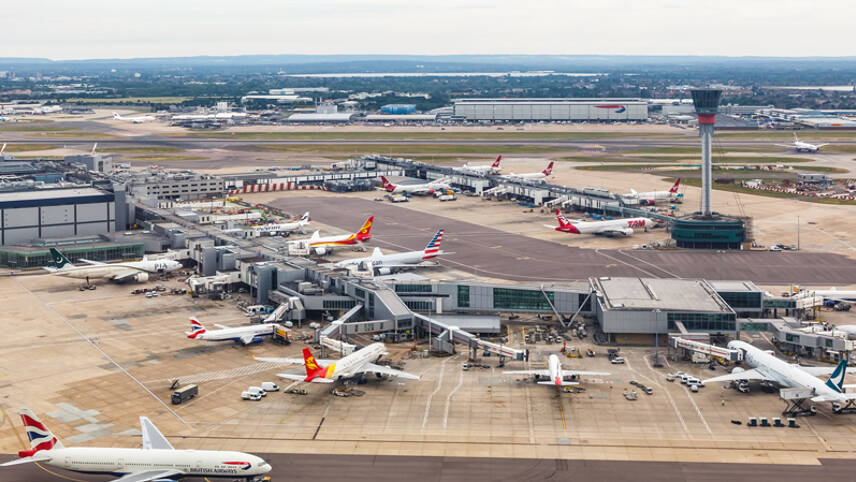Register for free and continue reading
Join our growing army of changemakers and get unlimited access to our premium content

Stock image: Heathrow Airport
Members of the House of Commons’ Environmental Audit Committee (EAC) have today (21 December) published a string of recommendations for aligning Britain’s aviation sector with its national and legally binding net-zero target. Their findings pick holes in current approaches to carbon accounting and alternative fuels.
Ministers have set the industry a 2040 target for domestic flights and airport operations, plus a 2050 net-zero target for international flights, as part of its ‘Jet-Zero Strategy’.
Launched in the summer of 2022, the Strategy aligns with the technology pathways for decarbonisation touted by the UK’s largest airlines and airports. The industry’s preferred approach is to improve efficiencies, scale-up alternative fuels (SAFs) and conduct some longer-term investments into hydrogen and electric aircraft.
Climate campaigners lambasted the Strategy for including no measures to limit demand while solutions like SAFs and next-gen aircraft are being developed.
EAC member Jerome Mayhew, Conservative MP for Broadland and Fakenham, said: “Aviation’s path to decarbonisation is substantially slower than that of many other sectors of the economy, and will require a number of different initiatives to make a tangible impact.”
Ministers have pushed rhetoric around “guilt-free flying” and “not clipping the sector’s wings” as it recovers from the Covid-19 pandemic. But the UK Government’s own advisors at the Climate Change Committee (CCC) have stated that capping expansion is necessary given the lack of mature solutions for low-carbon flying.
Today’s report reiterates these concerns. The EAC is calling on the Government to consider adding demand management to the Jet-Zero Strategy if predicted emissions reductions do not materalise within two years.
Supporting measures should include reducing train prices and implementing a frequent flier levy, Committee members are recommending. 70% of flights taken by Brits are made by a wealthy 15% of the population, with more than half (57%) of the general public taking no flights in any given year.
Processes for measuring emissions reductions must also be improved, the Committee has stated. It heard evidence that the UK Government is yet to include aviation emissions in its Carbon Budgets as some emissions occur internationally, and is advocating for change. Ministers have already pledged to incorporate international aviation in the 2033-2037 Carbon Budget.
Spotlight on fuels
Currently, less than 1% of UK demand is met by SAFs, which are the industry’s preferred lower-carbon technology option.
SAFs can typically be used in blends as a drop-in solution. International regulations limit blending to 50% at present, but the first long-haul flight using 100% SAF was completed last month, and the sector is developing aircraft capable of using 100% SAF for every journey.
The Jet-Zero Strategy includes a SAF mandate intended to balance supply and demand as production scales. The mandate would compel an increase each year in the mix of SAF in total fuel supply. Ministers have set out a 10% target for 2030, increasing to 70% by 2050.
Further details of the SAF mandate are due in the first quarter of 2024 and it should be enshrined in law by the start of 2025.
Also included in the Jet-Zero Strategy are proposals for emissions limits for which fuels can be classed as ‘sustainable’. While SAFs generate less greenhouse gas emissions at the point of combustion, supply chains for biofuels and synthetic fuels come with their own environmental impact.
The EAC has welcomed the mandate and the classification workstream. But members want to see a global definition of SAF developed with emissions requirements aligned internationally. They are also seeking safeguards against imported, higher-carbon SAF undercutting British producers.
For hydrogen and electric aircraft, the Committee heard that technologies are very immature for long-haul flights but may have applications in domestic flights. Realising this potential will require a concerted effort this decade to upgrade grid infrastructure and build out green hydrogen generation, storage and transport capacity, MPs were told.
The Committee calls on the Government to roll out electric and/or hydrogen aircraft on a number of routes on a pilot basis in the 2030s, with a view to a full rollout for all UK flights if successful.
Mayhew said: “We must support industry in developing new technologies and fuels, and provide the right certainty and definitions… and we must champion UK innovation on zero-carbon aircraft here at home for UK flights.”
The Government should respond to the EAC’s report in early 2024.


Please login or Register to leave a comment.